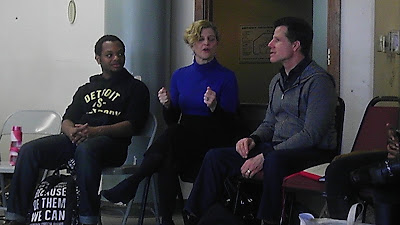OSF Artistic Director Bill Rauch Visits A.C.T.
By Simon Hodgson
Bill Rauch is in his ninth season as the artistic director
of the Oregon Shakespeare Festival (OSF). While visiting San Francisco for last
Thursday’s triumphant opening of the new musical The Unfortunates at The Strand Theater (it premiered at OSF in
2013), he sat down with A.C.T.’s M.F.A.
Program actors for a Q&A moderated by A.C.T. Artistic Director Carey
Perloff.
 |
| (L-R): M.F.A. Program actor Leonard A. Thomas, A.C.T. Artistic Director Carey Perloff, and OSF Artistic Director Bill Rauch. Photo by Simon Hodgson. |
Is classical theater
training still relevant?
It’s deeply necessary, but it’s becoming more and more rare.
At OSF, there’s a tension between casting new work and casting classical plays.
Ideally, you want actors who can play contemporary, classical, and musicals
too. Real repertory actors are very rare, because it’s a marathon, not a
sprint.
How do you create a
season?
At OSF, I was lucky enough to inherit the
Boarshead system, where we’ll do readings of potential productions with
department heads. When I joined the company, I broadened that circle to include
five company members, so we might have a stitcher or a bartender weighing in as
well. This means you get great feedback from a range of people across the whole
company. The strength of the Boarshead system was brought home to me in my very
first season at OSF. As part of expanding the classical canon, I wanted to put
on a Sanskrit epic, The Clay Cart,
which I love. We have long slots to program and short slots to program, and I
was thinking that this play would fit one of those short slots. After all, it’s
an Indian play set 2,500 years ago so it may not appeal to everyone. A guy from
marketing stood up and said, “This is Bill’s show and he wants to put his stamp
on the season. I think we should run it all season!” And he thumped his fist on
the table and everyone cheered. And so we did. [As a side note, A.C.T.’s
2016–17 season will include its own Sanskrit drama, Battlefield, directed by the legendary Peter Brook.]
What was the original
motivation behind Play On, OSF’s new project of commissioning contemporary
English adaptations of Shakespeare’s plays?
To me, the idea of these companion translations is really to
get at the specificity of the language. They’re intended to further
understanding, rather than to replace the original texts. Shakespeare is the
most produced playwright in this country for a reason. But remember: whenever
you put on a Shakespeare play, it’s some kind of adaptation. What folio are you
using? Which editor’s version? Which dramaturg? Which quarto? For our
adaptations, we’re commissioning 38 writers to take a deep dive into
Shakespeare. More than half of the writers are women, and more than half are
people of color.
While we’re talking about adapting Shakespeare,
it’s also worth including a story about how people respond to Shakespeare’s
language. When I was at Cornerstone Theater Company [co-founded by Rauch in
1986], we essentially loaded our theater into a truck. We’d go to these tiny
rural towns to put on shows. In Marmath, North Dakota [pop. 193] we put on a
production of Hamlet with a cast
composed of our actors and people from the town. During rehearsals, the
ranchers and their wives would really get into discussions about the language.
They wanted the play to be comprehensible to everyone, and they would come back
to us with questions such as “Why can’t we change this word to something we’d
actually say?” It was rewarding and humbling to hear what people thought and the
experience made us think about the text a little differently.
At OSF, you are both an
artist and an artistic director. What part of your life is most rewarding?
Being a parent is what grounds me—that’s the single most
important thing in my life. But if you’d ask me to choose between being the
leader that makes decisions about an arts organization and being an artist, I’d
choose artist—being in the rehearsal room, doing the work—every time.

